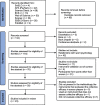Collective efficacy in soccer teams: a systematic review
- PMID: 34173889
- PMCID: PMC8236009
- DOI: 10.1186/s41155-021-00183-y
Collective efficacy in soccer teams: a systematic review
Abstract
Collective efficacy, defined as a group's shared belief about its conjoint capability to organize and execute courses of action, plays a pivotal role in understanding the dynamics of sports teams, since it influences what individuals choose to do as team members, how much they invest in motivational terms to perform actions, how much they work collectively, and for how long they persist despite failure. Through a systematic review, it was investigated how collective efficacy has been assessed in the context of soccer and which indicators, attributes, and psychometric properties have been contemplated in the instruments used. Following the PRISMA guidelines, 22 articles were retrieved through electronic databases (APA PsycINFO; SPORTDiscus; Science Direct; BVS; Web of Science; Scopus; PubMed; and Scielo), using as descriptors, in English, Spanish, and Portuguese, collective efficacy and soccer, combined by the Boolean operators AND and OR. The study did not delimit the initial year of publication for the searches carried out, including all articles found until January 14, 2021 (date of the last update). The following eligibility criteria were adopted: scientific articles published in journals; original studies, which specified the instrument used to assess collective efficacy and carried out with soccer athletes. Five instruments (FCEQ, CEQS, CEI, CEC, and CEQsoccer) that evaluated technical-tactical and psychological attributes associated with collective efficacy in soccer players were identified. In most studies, psychometric properties were restricted to content validity and reliability (internal consistency), and there were no suitable validation processes for the instruments used to measure collective efficacy, which can be considered a limiting factor for understanding this psychological construct in soccer modality.
Keywords: Collective efficacy; Group dynamics; Measurement; Psychometric instrument.
Conflict of interest statement
The authors declare that they have no competing interests.
Figures
Similar articles
-
Match Running Performance in Young Soccer Players: A Systematic Review.Sports Med. 2019 Feb;49(2):289-318. doi: 10.1007/s40279-018-01048-8. Sports Med. 2019. PMID: 30671900
-
[Psychometric characteristics of questionnaires designed to assess the knowledge, perceptions and practices of health care professionals with regards to alcoholic patients].Encephale. 2004 Sep-Oct;30(5):437-46. doi: 10.1016/s0013-7006(04)95458-9. Encephale. 2004. PMID: 15627048 Review. French.
-
Reference values for collective tactical behaviours based on positional data in professional football matches: a systematic review.Biol Sport. 2022 Jan;39(1):110-114. doi: 10.5114/biolsport.2021.102921. Epub 2021 Mar 6. Biol Sport. 2022. PMID: 35173369 Free PMC article. Review.
-
Effects of Small-Sided Game Interventions on the Technical Execution and Tactical Behaviors of Young and Youth Team Sports Players: A Systematic Review and Meta-Analysis.Front Psychol. 2021 May 7;12:667041. doi: 10.3389/fpsyg.2021.667041. eCollection 2021. Front Psychol. 2021. PMID: 34025529 Free PMC article.
-
Impact of the number of players on the emergence of creative movements in small-sided soccer games: a systematic review emphasizing deliberate practice.Front Psychol. 2023 Oct 16;14:1253654. doi: 10.3389/fpsyg.2023.1253654. eCollection 2023. Front Psychol. 2023. PMID: 37908820 Free PMC article.
Cited by
-
Association of self-efficacy and mental toughness with sport performance in Brazilian futsal athletes.Front Psychol. 2023 Jul 21;14:1195721. doi: 10.3389/fpsyg.2023.1195721. eCollection 2023. Front Psychol. 2023. PMID: 37546431 Free PMC article.
-
The structural relationship between achievement goal orientation and perceived performance among swimmers: a chain multiple mediation model.Front Psychol. 2025 May 6;16:1536743. doi: 10.3389/fpsyg.2025.1536743. eCollection 2025. Front Psychol. 2025. PMID: 40396144 Free PMC article.
References
-
- Atkinson F, Short SE, Martin J. College soccer players’ perceptions of coach and team efficacy. The Sport Psychologist. 2018;32(3):237–243. doi: 10.1123/tsp.2017-0066. - DOI
-
- Bandura A. Self-efficacy: The exercise of control. New York: W. H. Freeman; 1997.
-
- Bandura A. Guide for Constructing Self-Efficacy Scales. In: Pajares F, Urdan T, editors. Self-efficacy beliefs of adolescents. Greenwich: Information Age Publishing; 2006. pp. 307–337.
-
- Bandura A, Azzi RG, Polydoro S. Teoria Social Cognitiva - Conceitos Básicos [Cognitive social theory: basic concepts] Porto Alegre: Artmed; 2008.
-
- Bray SR. Collective efficacy, group goals, and group performance of a muscular endurance task. Small Group Research. 2004;35(1):230–223. doi: 10.1177/1046496403260531. - DOI
Publication types
Grants and funding
LinkOut - more resources
Full Text Sources

